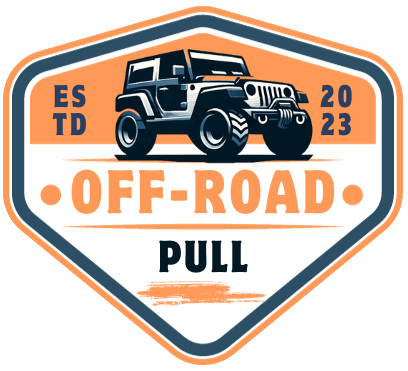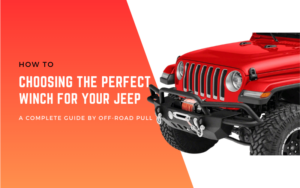Choosing the right winch for your Jeep is crucial for safe and successful off-roading. With so many options available, it can be overwhelming to decide which one is best for your needs.
This guide will break down the key factors to consider, so you can confidently select the perfect winch for your Jeep.
Key Factors to Consider When Choosing a Winch
Choosing the right winch for your Jeep involves understanding several critical factors that directly impact performance and safety.
Let’s break down the essentials so you can make the best decision for your needs.
Weight Capacity
The weight capacity of a winch is crucial. It determines how much weight the winch can safely pull without failing.
To choose the right capacity, start by knowing your Jeep’s gross weight (including any gear or modifications). A general rule is to select a winch with a capacity that’s 1.5 times your Jeep’s total weight.
For example, if your Jeep weighs 4,000 pounds, go for a winch with at least a 6,000-pound capacity. This extra margin ensures the winch can handle tough situations like steep inclines or deep mud, where pulling power needs to overcome not just weight but also resistance.
Type of Winch
You’ll primarily find two types of winches: electric and hydraulic.
Electric Winches:
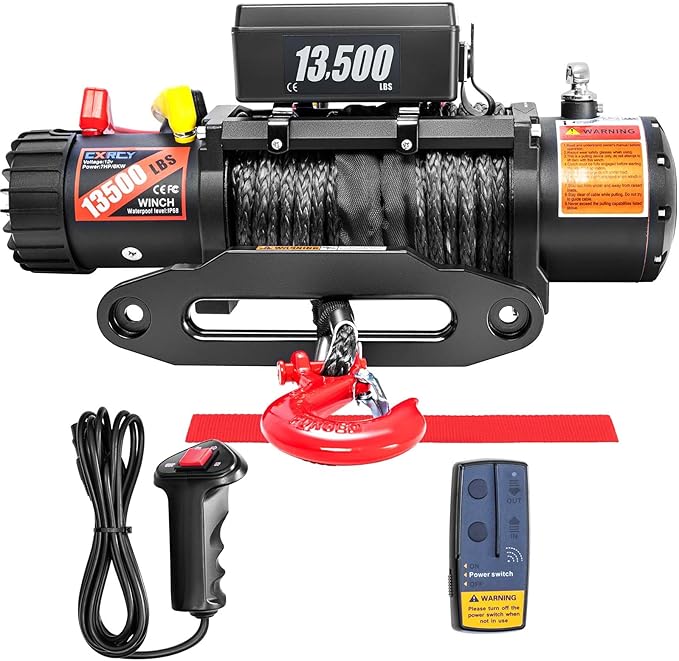
These are the most common for Jeep owners because they are easier to install and use. They draw power directly from your Jeep’s battery.
While they are convenient and effective for most off-road situations, they can drain the battery quickly, especially under heavy loads.
Hydraulic Winches:
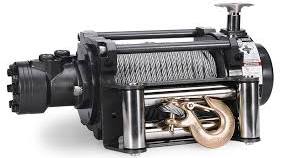
These are less common but offer superior power for heavy-duty tasks. They are powered by your Jeep’s power steering pump, which means they can run continuously without overheating.
However, they are more complex to install and maintain. If you frequently find yourself in extreme off-road conditions, a hydraulic winch might be worth the investment.
Winch Line
Your winch line is what physically pulls the Jeep, so its material and strength are vital. You have two main options:
Steel Cable:
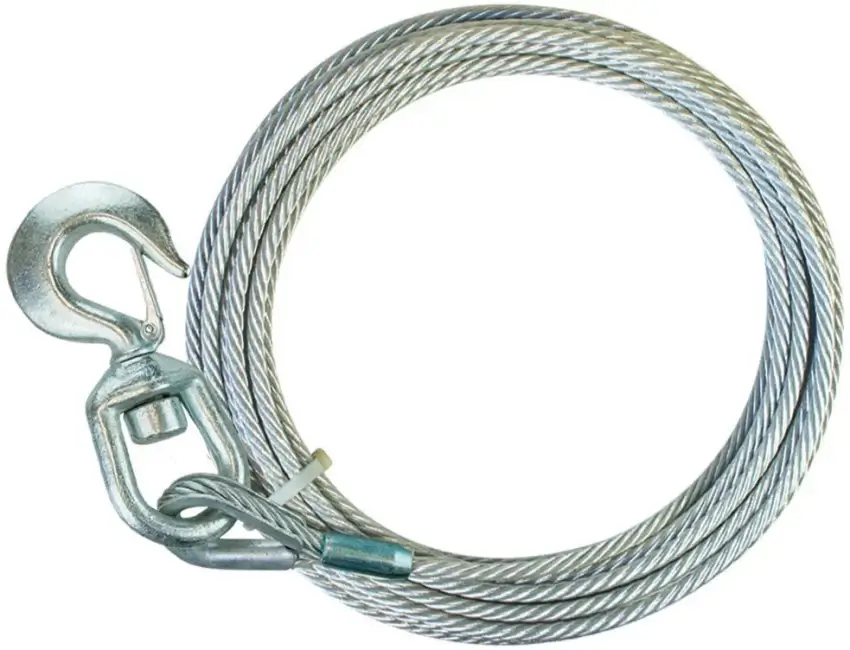
Known for its durability and strength, steel cable is ideal for rocky, rugged terrains. However, it’s heavier and can be hazardous if it snaps under tension. It’s tough and reliable but requires careful handling.
Synthetic Rope:
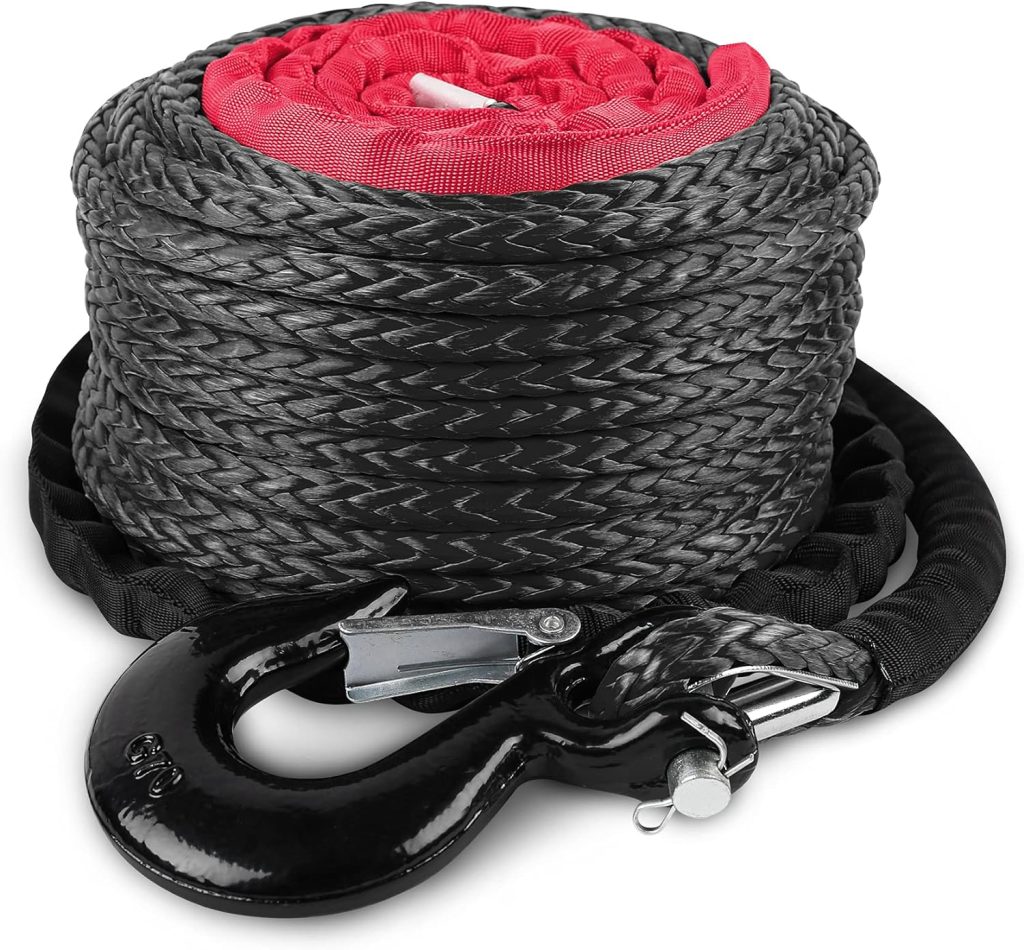
Lighter and safer than steel, synthetic rope is easier to handle and won’t recoil dangerously if it breaks. It’s also less likely to rust or kink.
However, it’s more susceptible to abrasion, UV damage, and needs more maintenance to ensure longevity. It’s a great option for most off-road scenarios, provided you protect it properly.
Motor Type
The motor is the driving force behind your winch, so choosing the right type is key:
Series Wound Motors:
These are the go-to for serious off-roaders because they are powerful and can handle continuous use. They are more durable and can manage higher loads without overheating, making them ideal for demanding winching tasks.
Permanent Magnet Motors:
These are lighter and more budget-friendly. They are suitable for occasional use and lighter tasks, but they can overheat with extended use.
If you don’t plan to use your winch frequently or in extreme conditions, this might be a cost-effective option.
Mounting Options
How and where you mount your winch affects its functionality and accessibility:
Front Mounting:
This is the most common setup, allowing you to pull your Jeep forward out of trouble. It’s straightforward and practical for most off-road situations.
Rear Mounting:
This option gives you the ability to pull your Jeep backward, which can be useful in certain recovery scenarios. However, it’s less common and requires a more specialized setup.
Multi-Mount Systems:
These allow you to move the winch between the front and rear, offering maximum flexibility. This setup is ideal if you want to be prepared for any situation, but it requires additional equipment and a bit more effort to install.
Power Source
Your winch’s performance depends heavily on your Jeep’s electrical system. Winches, especially electric ones, draw significant power, so your battery and alternator need to be up to the task.
If your Jeep has a standard battery, you might find that it struggles under the load of a high-power winch. In this case, upgrading to a heavy-duty battery or alternator ensures consistent power delivery, preventing failures in critical moments.
Make sure your Jeep’s power system can handle the demands of the winch you choose, especially if you plan on using it frequently.
Additional Features
Modern winches come with a variety of features that can enhance their functionality and ease of use:
Waterproofing:
Essential if you often find yourself off-roading in wet conditions. A waterproof winch can withstand water, mud, and other elements without shorting out.
Remote Controls:
These allow you to operate the winch from a distance, giving you better control and safety during recovery operations. Wireless remotes add even more convenience, though they may require extra batteries.
Automatic Braking Systems:
This feature automatically holds the load when you stop pulling, adding a layer of safety.
Fairleads:
These guide the winch line smoothly onto the drum, reducing wear and tear on the line. They’re especially important if you’re using synthetic rope.
Load Indicators:
These give you real-time feedback on the tension in the winch line, helping you avoid overloading the winch.
Common Mistakes to Avoid When Choosing a Winch
When selecting a winch for your Jeep, avoiding common mistakes can save you from a lot of headaches down the road. Here’s what to watch out for:
1. Underestimating Weight Capacity
A common pitfall is choosing a winch with a weight capacity that’s too low. It might seem like a good idea to save money by going with a smaller, cheaper winch, but this can backfire quickly.
If the winch isn’t powerful enough to handle your fully-loaded Jeep, it won’t be able to pull you out of tough spots. Always calculate your Jeep’s gross weight (including any gear) and choose a winch with at least 1.5 times that capacity.
This ensures you have the pulling power you need, especially in challenging situations like steep hills or deep mud.
2. Choosing the Wrong Type of Line
Another mistake is not giving enough thought to the type of winch line. Steel cable and synthetic rope both have their pros and cons, and picking the wrong one for your needs can lead to trouble.
Steel cable is strong and durable but can be dangerous if it snaps. Synthetic rope is lighter and safer but requires more care to avoid damage.
Consider the terrain you’ll be off-roading on and how much maintenance you’re willing to do. The right line choice can make your winching experience safer and more efficient.
3. Overlooking Power Requirements
Your winch relies heavily on your Jeep’s electrical system. If your battery or alternator isn’t up to the task, your winch might not perform when you need it most.
This is especially true for electric winches, which draw a lot of power. Before buying, check your Jeep’s battery and alternator capacity. You may need to upgrade to ensure your winch gets the power it needs without draining your battery or causing electrical issues. Skipping this step can lead to frustration and failure during critical moments.
By avoiding these common mistakes—underestimating weight capacity, choosing the wrong line, and overlooking power requirements—you’ll be better equipped to select a winch that’s reliable, effective, and perfectly suited to your Jeep’s needs.
Conclusion
Choosing the right winch for your Jeep is all about understanding your needs and knowing what to look for. Whether you’re an off-road enthusiast or just want to be prepared for any situation, a winch is an invaluable tool.
By considering factors like weight capacity, motor type, and winch line, you can make an informed decision that will serve you well for years to come.
Remember, when it comes to off-roading, it’s always better to be over-prepared than caught off guard.
